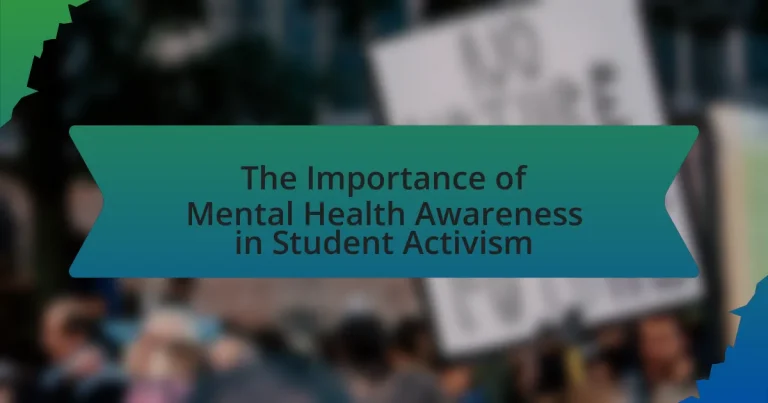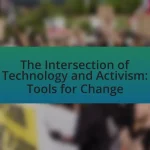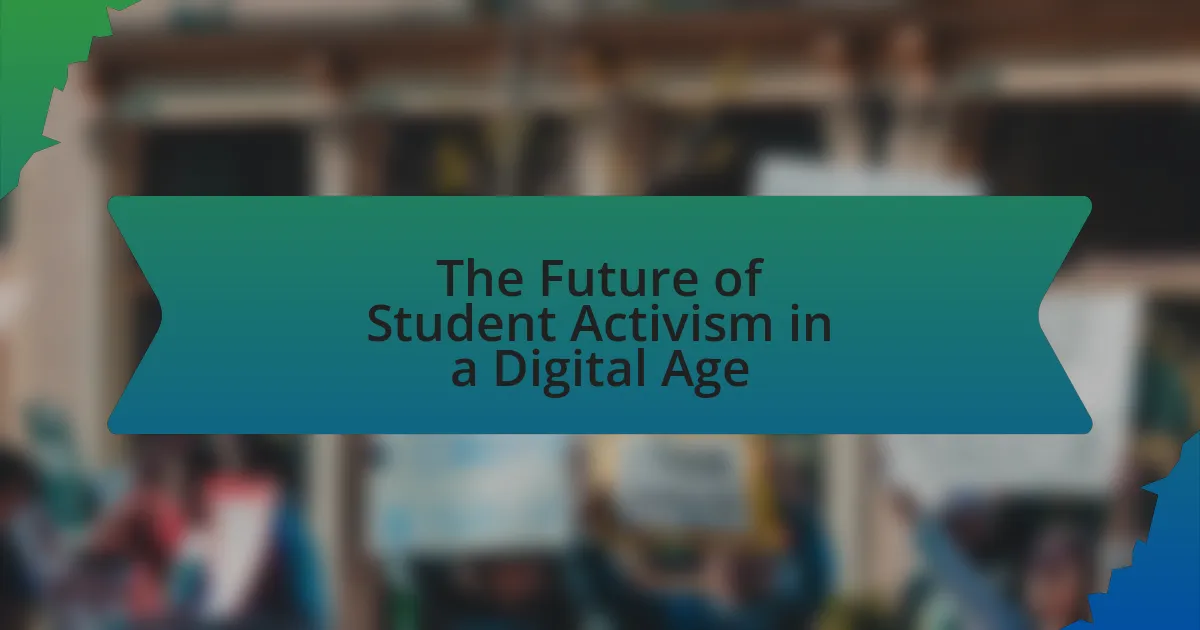The article focuses on the importance of mental health awareness in student activism, highlighting how it fosters a supportive environment for open dialogue about mental health issues. It discusses the common mental health challenges faced by student activists, such as anxiety and burnout, and emphasizes the need for coping strategies and support systems. The article also explores how mental health awareness can enhance engagement, collaboration, and overall effectiveness in activism, while outlining potential risks of neglecting mental health. Additionally, it provides insights into initiatives and best practices that can promote mental health awareness among student activists, ultimately contributing to a more resilient and inclusive activist community.
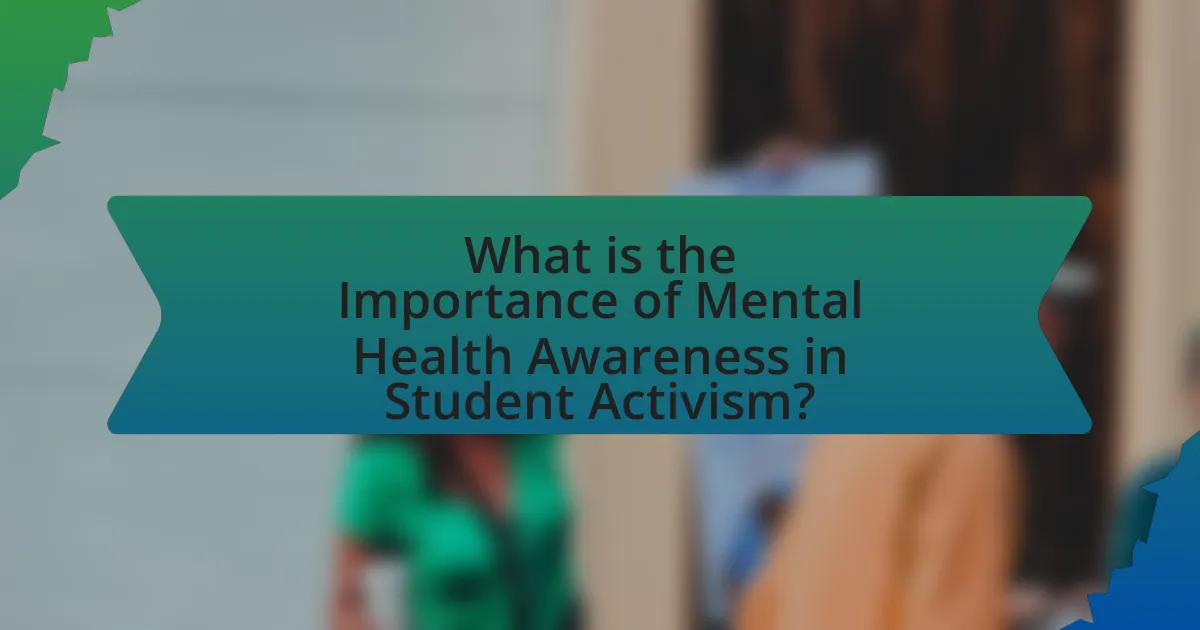
What is the Importance of Mental Health Awareness in Student Activism?
Mental health awareness is crucial in student activism as it fosters a supportive environment that encourages open dialogue about mental health issues. This awareness helps students recognize the impact of stress, anxiety, and depression on their activism efforts, leading to healthier coping strategies and improved overall well-being. Research indicates that students engaged in activism often face heightened emotional challenges; for instance, a study published in the Journal of American College Health found that 39% of college students reported experiencing significant anxiety related to their activism. By prioritizing mental health, student activists can enhance their resilience, sustain their engagement, and create a more inclusive movement that addresses the mental health needs of all participants.
Why is mental health awareness crucial for students involved in activism?
Mental health awareness is crucial for students involved in activism because it helps them manage stress, prevent burnout, and maintain overall well-being. Activism often involves high levels of emotional engagement and can lead to feelings of frustration, anxiety, and isolation. Research indicates that students engaged in activism may experience increased mental health challenges; for instance, a study published in the Journal of American College Health found that 30% of college students reported feeling overwhelmed by anxiety related to their activism efforts. By promoting mental health awareness, students can develop coping strategies, seek support, and create a sustainable approach to their activism, ultimately enhancing their effectiveness and resilience in advocating for change.
What are the common mental health challenges faced by student activists?
Student activists commonly face mental health challenges such as anxiety, depression, burnout, and feelings of isolation. These challenges arise from the high levels of stress associated with activism, including the pressure to effect change, confront systemic issues, and manage public scrutiny. Research indicates that 61% of student activists report experiencing anxiety, while 45% report symptoms of depression, highlighting the significant mental health impact of their advocacy efforts. Additionally, the emotional toll of activism can lead to burnout, characterized by exhaustion and a diminished sense of personal accomplishment, which further exacerbates feelings of isolation among student activists.
How does mental health awareness impact student activism outcomes?
Mental health awareness significantly enhances student activism outcomes by fostering a supportive environment that encourages participation and engagement. When students are educated about mental health, they are more likely to advocate for policies that address mental health issues, leading to increased activism focused on well-being initiatives. Research indicates that campuses with strong mental health awareness programs see higher rates of student involvement in activism, as students feel empowered to voice their concerns and support one another. For instance, a study published in the Journal of American College Health found that students who participated in mental health awareness campaigns reported a 30% increase in their likelihood to engage in activism related to mental health policies. This correlation underscores the importance of mental health awareness in mobilizing student activism effectively.
How does mental health awareness influence student engagement in activism?
Mental health awareness significantly enhances student engagement in activism by fostering a supportive environment that encourages open dialogue and collective action. When students are educated about mental health issues, they become more empathetic and understanding towards their peers, which can lead to increased participation in advocacy efforts. Research indicates that students who are aware of mental health challenges are more likely to engage in initiatives that promote mental well-being, as seen in studies conducted by the American Psychological Association, which found that mental health awareness campaigns on campuses led to a 30% increase in student involvement in related activism. This engagement not only empowers students to advocate for mental health resources but also cultivates a sense of community and shared responsibility, further driving activism efforts.
What role does mental health play in sustaining student activism efforts?
Mental health is crucial for sustaining student activism efforts as it directly influences students’ motivation, resilience, and overall well-being. When students maintain good mental health, they are more likely to engage actively in advocacy, collaborate effectively with peers, and cope with the challenges that arise during activism. Research indicates that high levels of stress and burnout can lead to decreased participation in activism, as seen in a study published in the Journal of Youth Studies, which found that students experiencing mental health issues reported lower levels of engagement in social movements. Thus, prioritizing mental health support within activist communities can enhance participation and sustain long-term commitment to social causes.
How can mental health awareness enhance collaboration among student activists?
Mental health awareness can enhance collaboration among student activists by fostering a supportive environment that prioritizes emotional well-being. When student activists understand the importance of mental health, they are more likely to communicate openly about their challenges, leading to stronger bonds and teamwork. Research indicates that groups with high emotional intelligence, which includes awareness of mental health, demonstrate better collaboration and problem-solving abilities. For instance, a study published in the Journal of Educational Psychology found that students who engage in discussions about mental health are more likely to support one another, resulting in increased collective efficacy and motivation to achieve common goals. Thus, mental health awareness not only improves individual resilience but also strengthens the overall effectiveness of student activism initiatives.
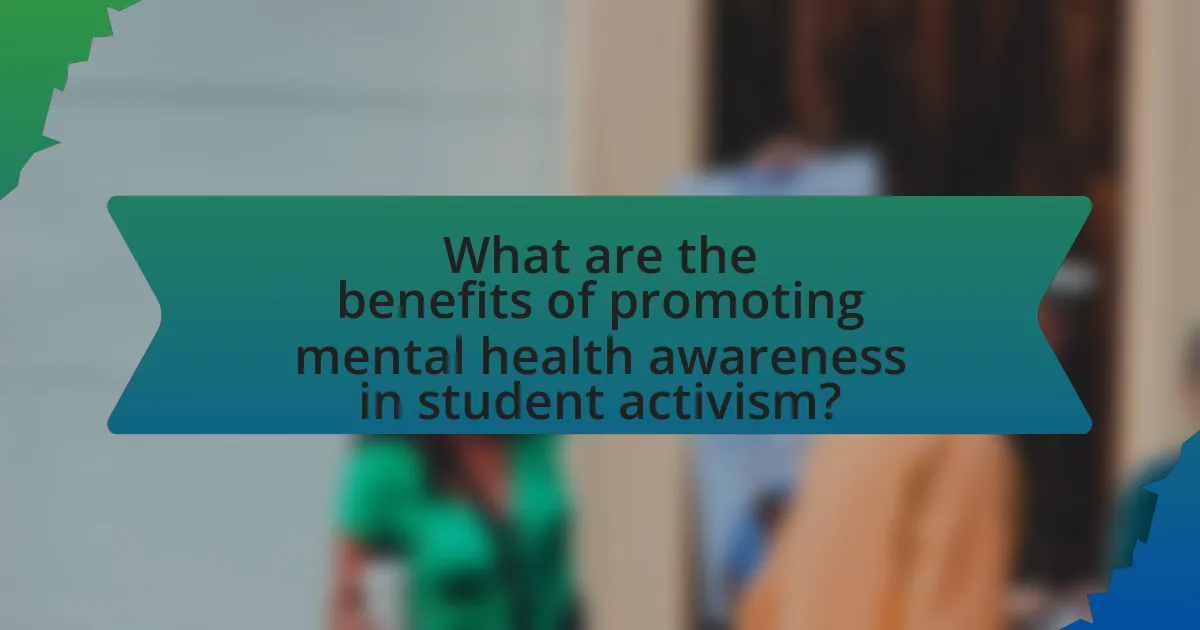
What are the benefits of promoting mental health awareness in student activism?
Promoting mental health awareness in student activism enhances community support, reduces stigma, and fosters resilience among students. By raising awareness, student activists create an environment where mental health issues are openly discussed, leading to increased understanding and empathy. Research indicates that initiatives focused on mental health awareness can significantly decrease stigma; for instance, a study published in the Journal of American College Health found that mental health education programs led to a 30% reduction in stigma among participants. Furthermore, promoting mental health awareness equips students with coping strategies, which can improve their overall well-being and academic performance, as evidenced by findings from the American Psychological Association that link mental health support to higher student retention rates.
How does mental health awareness contribute to a supportive activist community?
Mental health awareness fosters a supportive activist community by promoting understanding and empathy among its members. When individuals are educated about mental health issues, they are more likely to recognize the signs of distress in themselves and others, leading to a culture of support rather than stigma. Research indicates that communities with high mental health awareness report lower levels of burnout and higher levels of engagement, as seen in studies conducted by the American Psychological Association, which highlight the correlation between mental well-being and community cohesion. This understanding encourages open dialogue, allowing activists to share their experiences and seek help, ultimately strengthening the community’s resilience and effectiveness in advocating for change.
What initiatives can be implemented to promote mental health awareness among student activists?
Initiatives to promote mental health awareness among student activists include organizing workshops that focus on stress management and resilience-building, implementing peer support programs, and integrating mental health education into activist training sessions. Workshops can provide students with practical tools to cope with the pressures of activism, as studies show that 40% of student activists experience high levels of stress. Peer support programs foster a sense of community and belonging, which is crucial for mental well-being, as research indicates that social support can reduce anxiety and depression. Additionally, incorporating mental health education into training ensures that activists are equipped with knowledge about self-care and available resources, enhancing their overall effectiveness and sustainability in activism.
How can peer support networks improve mental health in activist circles?
Peer support networks can significantly improve mental health in activist circles by providing emotional support, fostering a sense of belonging, and reducing feelings of isolation. These networks create safe spaces where individuals can share their experiences and challenges, which is crucial in high-stress environments often associated with activism. Research indicates that social support is linked to lower levels of anxiety and depression, as highlighted in a study published in the Journal of Community Psychology, which found that peer support can enhance resilience among activists facing burnout. By facilitating open communication and mutual understanding, peer support networks empower individuals to cope with the unique pressures of activism, ultimately promoting better mental health outcomes.
What are the potential risks of neglecting mental health in student activism?
Neglecting mental health in student activism can lead to significant risks, including burnout, decreased academic performance, and increased vulnerability to mental health disorders. Burnout occurs when students become overwhelmed by the demands of activism without adequate self-care, leading to exhaustion and disengagement. Research indicates that 39% of college students report feeling overwhelmed by anxiety, which can be exacerbated by the pressures of activism. Additionally, neglecting mental health can result in lower academic performance, as students may struggle to balance their activism with their studies, leading to declining grades and academic probation. Furthermore, the lack of mental health support can increase the risk of developing conditions such as depression and anxiety disorders, which affect approximately 1 in 5 young adults. These risks highlight the critical need for mental health awareness and support within student activism to ensure the well-being of student activists.
How can burnout affect student activists and their causes?
Burnout can significantly hinder student activists and their causes by diminishing their motivation, energy, and effectiveness in advocacy efforts. When student activists experience burnout, they often face emotional exhaustion, depersonalization, and a reduced sense of accomplishment, which can lead to disengagement from their causes. Research indicates that prolonged stress and burnout can result in decreased productivity and creativity, ultimately stalling initiatives aimed at social change. For instance, a study published in the Journal of Educational Psychology found that burnout among student leaders negatively impacted their ability to mobilize peers and sustain activism efforts, thereby weakening the overall impact of their movements.
What are the long-term consequences of poor mental health on student activism?
Poor mental health significantly undermines student activism over the long term by reducing participation, diminishing motivation, and impairing the ability to organize effectively. Students experiencing mental health issues often face challenges such as anxiety and depression, which can lead to withdrawal from social and political engagement. Research indicates that mental health problems can decrease the likelihood of students participating in activism by up to 50%, as reported in a study published in the Journal of American College Health. Furthermore, the stigma surrounding mental health can create barriers to seeking help, exacerbating feelings of isolation and helplessness, which further diminishes the collective strength of student movements. Consequently, the long-term effects include weakened advocacy efforts, reduced social change impact, and a less vibrant campus culture.
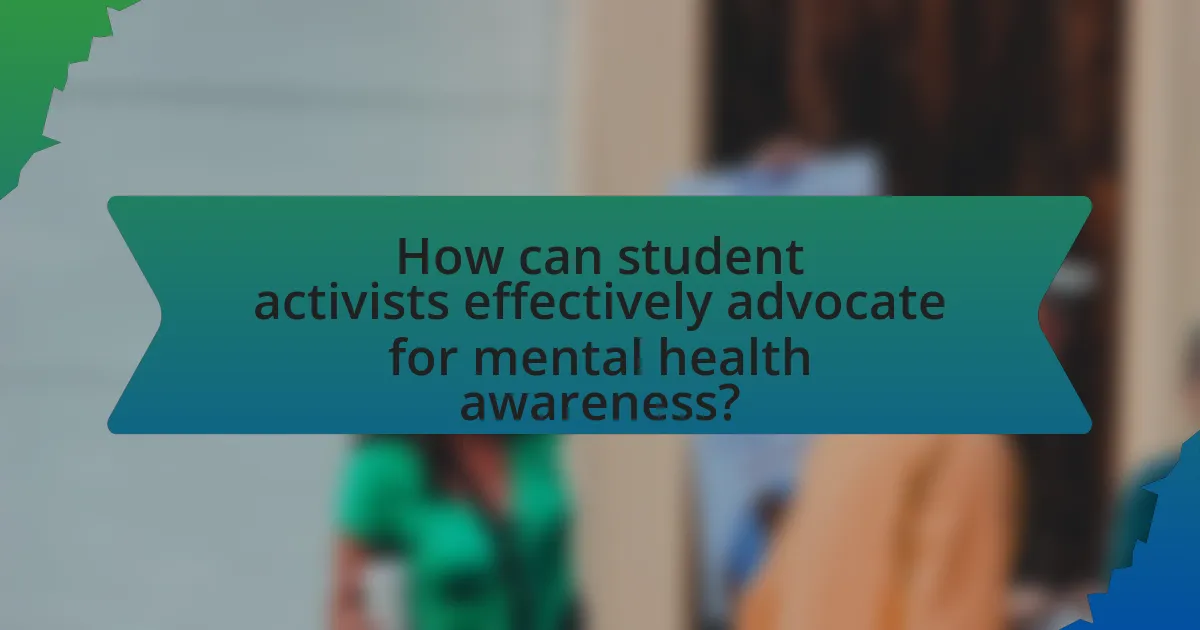
How can student activists effectively advocate for mental health awareness?
Student activists can effectively advocate for mental health awareness by organizing campaigns that educate peers about mental health issues and available resources. These campaigns can include workshops, informational booths, and social media outreach to disseminate accurate information and reduce stigma. Research indicates that peer-led initiatives significantly increase awareness and understanding of mental health among students, as demonstrated by a study published in the Journal of American College Health, which found that peer education programs improved mental health literacy by 30%. By leveraging their unique position within the student community, activists can foster a supportive environment that encourages open discussions about mental health, ultimately leading to increased awareness and access to necessary support services.
What strategies can be employed to raise mental health awareness on campus?
To raise mental health awareness on campus, institutions can implement peer-led support groups, educational workshops, and mental health campaigns. Peer-led support groups create a safe space for students to share experiences and seek help, fostering community and reducing stigma. Educational workshops can provide students with information on mental health issues, coping strategies, and available resources, enhancing their understanding and encouraging proactive engagement. Mental health campaigns, such as awareness weeks or social media initiatives, can effectively reach a broader audience, promoting dialogue and encouraging students to seek help when needed. Research indicates that such initiatives can significantly improve mental health literacy and reduce stigma among students, as evidenced by studies showing increased help-seeking behavior following awareness campaigns.
How can social media be leveraged to promote mental health initiatives in activism?
Social media can be leveraged to promote mental health initiatives in activism by creating awareness, fostering community support, and facilitating information sharing. Platforms like Twitter, Instagram, and Facebook allow activists to disseminate mental health resources, share personal stories, and engage with a broader audience. For instance, campaigns such as #MentalHealthAwareness have successfully reached millions, highlighting the importance of mental health in various activist movements. Research indicates that social media can reduce stigma and encourage open discussions about mental health, as seen in studies published by the American Psychological Association, which show that online communities can provide essential support and validation for individuals facing mental health challenges.
What partnerships can enhance mental health advocacy efforts among student groups?
Partnerships with mental health organizations, educational institutions, and local community services can significantly enhance mental health advocacy efforts among student groups. Collaborating with established mental health organizations, such as the National Alliance on Mental Illness (NAMI), provides access to resources, training, and expertise that can empower student advocates. Educational institutions can offer platforms for awareness campaigns and workshops, while local community services can facilitate outreach programs and support networks. Research indicates that such collaborations increase the effectiveness of advocacy initiatives, as they leverage diverse resources and expertise, ultimately leading to improved mental health outcomes for students.
What best practices should student activists follow to maintain their mental health?
Student activists should prioritize self-care, establish boundaries, and seek support to maintain their mental health. Engaging in regular self-care activities, such as exercise, mindfulness, and adequate sleep, helps reduce stress and improve overall well-being. Setting clear boundaries around activism commitments prevents burnout and allows for personal time. Additionally, seeking support from peers, mentors, or mental health professionals provides essential emotional resources. Research indicates that students involved in activism experience higher levels of stress, making these practices crucial for sustaining mental health and effectiveness in their advocacy efforts.
How can self-care practices be integrated into activist routines?
Self-care practices can be integrated into activist routines by scheduling regular breaks, setting boundaries, and incorporating mindfulness techniques. Activists can prioritize mental health by allocating specific times for self-care activities, such as meditation or exercise, which have been shown to reduce stress and improve overall well-being. Research indicates that individuals who engage in self-care are more resilient and effective in their advocacy efforts, as highlighted in a study published in the Journal of Community Psychology, which emphasizes the correlation between self-care and sustained activism. By consciously embedding these practices into their daily routines, activists can maintain their mental health while effectively pursuing their causes.
What resources are available for student activists seeking mental health support?
Student activists seeking mental health support can access various resources, including campus counseling services, mental health hotlines, and peer support groups. Campus counseling services typically offer free or low-cost therapy sessions, workshops, and mental health awareness programs tailored for students. Mental health hotlines, such as the National Suicide Prevention Lifeline, provide 24/7 support and can connect students with trained counselors. Additionally, peer support groups foster a sense of community and allow activists to share experiences and coping strategies. These resources are essential for maintaining mental well-being while engaging in activism, as studies show that activism can lead to increased stress and burnout among students.
